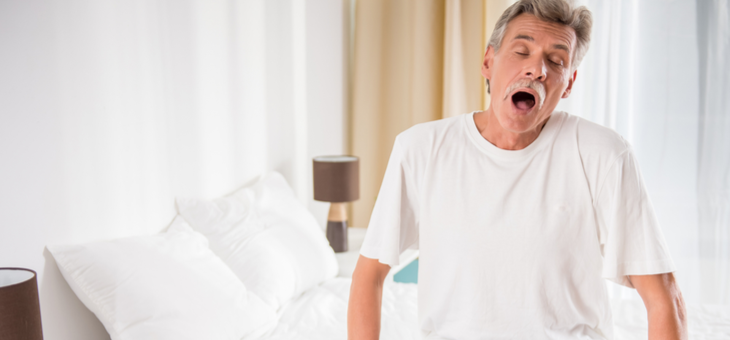As the number of candles on your birthday cake grows, you might notice that you wake up earlier or throughout the night. You may also find that you get fewer hours of shut-eye, or you fall asleep more during the day.
Along with the physical changes that occur as we get older, changes to our sleep patterns – what specialists call ‘sleep architecture’ – are a part of the normal ageing process. It is a common misconception, however, that sleep needs decline with age. In fact, research demonstrates that our sleep needs remain constant throughout adulthood, with seven to nine hours being the recommended amount.
Despite this being the case, older people tend to spend more time in the lighter stages of sleep than in deep sleep. They also report having more fragmented sleep, being more tired during the day and wanting to go to bed earlier in the evening.
This may be due to a decrease in the amount of melatonin – the hormone that promotes sleep – that can be a normal part of ageing, as well as a decrease in growth hormone levels, possibly causing you to experience a decrease in deep sleep (an especially refreshing part of the sleep cycle).
Read more: Sleep issues linked to heart attacks
While these changes are common – and quite normal as people age, disturbed sleep, waking up tired every day, and other symptoms such as poor daytime concentration, are not a normal part of ageing and may indicate an underlying sleeping disorder.
It’s important to speak to your healthcare professional if you are concerned you may have a sleep disorder or if symptoms persist.
Are you experiencing sleeplessness?
Women, the elderly and people under stress are more likely to experience sleeplessness. If sleeplessness occurs, you may experience any one of the following:
-
- taking a long time – more than 30 to 45 minutes – to fall asleep
-
- waking up many times each night
-
- waking up early and being unable to get back to sleep
-
- waking up feeling tired.
Read more: Can quality sleep prevent Alzheimer’s?
Often there is an underlying but very treatable cause for sleeplessness. Ask yourself: Are you experiencing a lot of stress? Are you struggling with worry or nervous tension? Are you getting enough exercise and natural light during the day?
If you suspect any of these issues are affecting you, there are many natural ways to improve sleep quality. Consider:
-
- engaging in stress management strategies
-
- ensuring you create a favourable sleep environment – having a comfortable, quiet and dark room and avoiding digital devices before bed
-
- sticking to a regular sleep schedule
-
- ensuring you get at least two hours of natural light during the day – either by being outdoors or keeping shades open while inside
-
- reducing daytime napping
-
- ensuring you get regular, daily exercise
-
- avoiding consumption of alcohol and caffeine close to bedtime.
Read more: What sleeping naked can do for you
You may also consider some herbal support from products such as ReDormin Forte, which can help reset the sleep cycle. It contains a combination of evidence-based herbal extracts clinically shown to help re-establish healthy sleep patterns and increase the time spent in the deeper, restorative stages of the sleep cycle.
Have you been troubled with sleep issues as you’ve aged? Do you think it is related to such factors as stress? Have you found a solution? Why not share your thoughts in the comments section below?
Disclaimer: This article contains general information about health issues and is not advice. For health advice, consult your medical practitioner.

